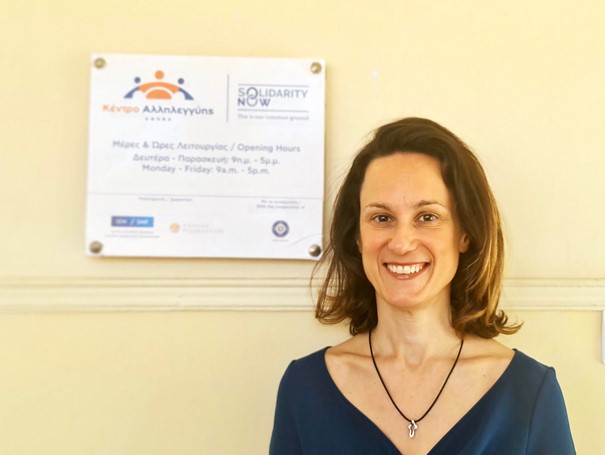By Trudeke Sillevis Smitt
Overload, rejections, bureaucracy, but also small bright spots: Marina Kanta outlines the work of an asylum lawyer in Athens in a Zoom interview.
What is it like to be an asylum lawyer in Athens? Marina Kanta provides legal advice at the NGO Solidarity Now, which offers – besides legal aid – social, administrative and psychological assistance to refugees. She also provides government-funded legal aid to asylum seekers in appeal cases. Although, according to Kanta, the government invariably says they have the numbers of incoming refugees ‘under control’, they notice little of this in Athens. ‘We work with four lawyers at Solidarity Now in Athens and get 10 to 30 new clients every day. We cannot possibly help all of them.’
This is partly because refugees trapped on the islands have recently been allowed to travel further if they waive the right to shelter, says Kanta. ‘People arriving on the islands are deprived of their freedom, they often stay in overcrowded, largely closed camps. Those camps are usually very remote; there is no way to integrate. If people are there for a while, they will sign anything, as long as they get rid of those restrictions.’
Clueless
These asylum seekers arrive in Athens without any protection and have no idea how to proceed. Kanta: ‘They seek help from NGOs, but many of them have stopped due to lack of funding. The remaining organisations are struggling with overload.’
Lately, many, mostly young, Egyptians have been coming, Kanta says. ‘Egypt is facing an economic crisis since the invasion of Ukraine. The minimum wage is about €116, while the price level is similar to Greece. But these people do not qualify for asylum. They become illegal and often try to travel further into Europe.’
Noteworthy: recently, people living illegally in Greece can get a regular permit if they prove they have been in the country for at least three years and have a job offer. Kanta: ‘It is a surprising response by the Mitsotakis government – which is not known for welcoming migration – to complaints from society: you counter migration, but we can’t find people for our hotels, in construction and in agriculture, making everything more expensive.’
The scheme is valid until the end of this year, but Kanta hopes for an extension: ‘It is very important, because everyone benefits, including the state: undeclared work becomes legal this way, so tax is paid on it.’
Silver lining
She could use such a bright spot. Apart from being overburdened, we are also discouraged by repeated rejections,’ says Kanta. ‘Asylum seekers are not entitled to legal assistance until the appeal stage, but if this means that asylum grounds have been left undiscussed, I can no longer cite them; that only arouses suspicion. There should be legal support at the first stage.’
And then there is bureaucracy. Kanta: ‘Lawyers should have access to authorities, but this is obstructed, preventing refugees from exercising their rights. To enter a camp, we have to ask permission three days in advance. If you can’t make it at the prescribed time, you need to start all over again. And since covid, access to many government bodies such as the Greek Asylum Service [similar to the Dutch ‘IND’, ed.] and the issuing authority of regular residence permits is restricted.
Paradoxically, the system is actually increasingly geared towards short-term deadlines. Kanta: ‘Previously, the asylum hearing took four hours and if that was not enough, a new date was scheduled. Now everything has to be done in one session, even if the asylum seeker is exhausted or something needs sorting out. In the border procedure, the appeal period is only 10 days and appeals have no automatic suspensive effect.’
The European Migration Pact, which was concluded last year and is to be implemented in the coming years, seems to prescribe even tighter deadlines. ‘How is someone who has just arrived and does not speak the language supposed to understand what is going on and find a lawyer in such a short time?’ wonders Kanta. ‘Even us lawyers often don’t understand what is going on.’
Cancel holidays
Kanta does not feel constrained in criticising the government. For instance, she says lawyers have to wait between six and 10 months for payment after submitting expenses, but in the meantime have to pay taxes on them. ‘It is not deliberate, but a typical case of bureaucracy. You have to have savings to cope with this, sometimes you have to cancel a holiday.’
And the precarious subject of pushbacks? ‘We don’t speak out about that on the mainland because we can’t talk about it from our own experience. But we hear statements from our colleagues on the islands. The shipwreck at Pylos, for instance, came as a big shock.’
That shipwreck killed hundreds of asylum seekers last year. Authorities immediately charged nine Egyptian survivors with human smuggling and blamed them for the disaster, while according to NGO and media investigations, there were indications that they were used as scapegoats and that authorities had failed to respond to distress calls. The ‘Pylos nine’ were in pre-trial detention for almost a year. In May this year, the Greek criminal court declared itself incompetent because the disaster took place in international waters.
To prevent such maritime disasters, Kanta advocates safe escape routes. ‘By that I mean that a state allows people to apply for a residence permit from their country of origin for labour or asylum, so they can come in a safe way.’
Psychological assistance
Because of all the pressure, Solidarity Now provides the lawyers with psychological help. ‘We learn to deal with difficult situations. With angry, frustrated, and traumatised clients. We desperately need that, also for our own well-being. Sometimes your battery is completely empty, you have nothing left to give. You are numb with emotional exhaustion, feelings of disappointment and failure because everything is rejected. That is a very unpleasant feeling and you have to deal with it, otherwise it can also be harmful. Yes, I consider myself lucky for receiving that help.’
This article was written by Trudeke Sillevis Smit, an independent journalist who writes articles for the “Lawyers for Lawyers” column for the Advocatenblad, a Dutch lawyers magazine. This column focuses on lawyers worldwide who experience problems in or through their work. In it, the editors collaborate with Lawyers for Lawyers (L4L). Please find the Dutch version of the article here.




